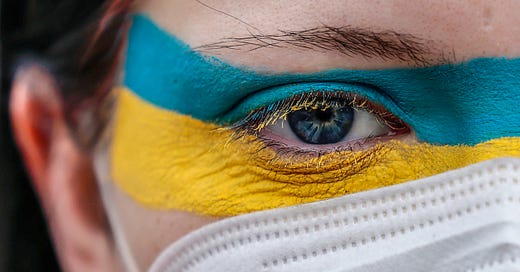Old Ukraine Is Gone. Ukrainians Carry On.
The country we loved will never be the same. Amid fear, mourning, and hatred, find comfort.

“I was wondering why you had a Ukrainian-looking snout.”
I was in my freshman year in college and attending Russian Table, a regular meeting of Russian-speaking students and anyone interested in practicing their Russian, when an older man I hadn’t seen before asked me where I was from.
When I said “I’m from Ukraine,” he began insulting me.
A Russian friend of mine, Dima, overheard him and sharply intervened. He was told he “looked like a Jew.”
This small, white-haired man then launched into an attack on the Kazakhs present, and berated our team leader, who was from Moscow, for “having a Ukrainian-sounding last name.” According to this man, none of us were “Russian enough” to have the privilege of running Russian Table.
We were all young—and dumbfounded. Dima was a big guy, but he wasn’t sure how to physically remove the tiny, seething lunatic from our presence. It just seemed so grotesque.
Eventually, the man left on his own accord, after we repeatedly asked him to go. I remember how we looked at each other as he proudly shuffled off, and how confused and alarmed everyone was.
In the last few days I’ve thought about that day at Russian Table often. It was like an omen, a hint of the violence to come.
The ethnonationalist speech that Putin gave before he started this latest atrocity is an echo of every insult I’ve ever received from a Russian for identifying with Ukraine. We are an artificial people in the eyes of the Russian Reich. When we insist on being real, we’re called extremist and dangerous. We’re told to lie down and die.
Instead, Ukrainians are throwing themselves at tanks. Would anyone do that for an artificial identity and homeland?
Closed off in his palaces, surrounded by a circle of pliant yes-men in expensive suits, men made rich like shiny ticks off the Kremlin’s corruption, Putin does not see Ukrainians. But the world does.
As I type this, the people I know and love in Ukraine are alive and accounted for—scared, angry, tortured, shaking with righteous fury, fighting on the battlefield, cradling terrified children and animals, but alive. This could change at any moment, and so while I’m here, I’m not really here. When a ghoul seeks to destroy your birthplace, your soul is unmoored.
I am doing my best to help the war effort with the skills and tools in my possession, but I feel like a traitor for being far away. I don’t want or need to be reassured or excused for my absence—my need to care for a young child ties me to my adopted motherland, the United States. But I’m here, and others are there—that fact won’t leave me alone.
Putin was bound to miscalculate. He truly believed Ukrainians would greet his soldiers with flowers or, at the very least, with cowardice. My friend, the writer A.D. Miller, who spent time in Moscow, has said that Putin misunderstands human nature—he thinks people are “driven only by money, or fear of someone with a bigger stick.” Putin’s nihilism is challenged by Ukrainians, but it’s foolish to think he will have an epiphany.
Lightning partition of Ukraine was Putin’s obvious goal, but now that he’s failed, he’s turned to frustration as rockets rain down in Kharkiv and Kyiv. Will he turn Kyiv into another Aleppo? He is ruthless enough, and the idea that “Oh no, he can’t do that, those aren’t Arabs!” is borne of both prejudice and silly naïveté.
My fervent hope is that as sanctions continue to tank the Russian economy, Putin’s inner circle begins to ripple with real worry. These sycophants signed up to be rich demigods—not international pariahs. Sure, they had no problem abusing, harassing, robbing, and even occasionally murdering a few people here and there—but they never thought they’d be sanctioned!
As Putin’s answer to sanctions has been to place more strain on his own people, the Kremlin seems to be sliding ever closer to North Korea. Abroad, acts of sabotage against Russian oligarchs are only the beginning.
I have never prayed for the death of another human being, but I don’t believe that talk of a face-saving off-ramp is realistic for Putin at this time. He has gambled too recklessly. Habituated to ordering “special operations” against comparably defenseless victims in places like Syria, he is now engaged in a war in a country of 40 million well-armed people who fervently hate his guts. Yet his image back home depends on being an unshakable strongman recapturing Russia’s old glory. He will not back down—but a convenient heart attack or another such unfortunate event could spare millions.
Letting go of idealism is one of the most painful parts of being unjustly attacked. In struggling with this, I recall the day I buried my father in Kyiv. It was a bright spring morning in 2021, and as we surrounded the casket at the funeral home, I put my hand on his hand. His skin felt like pure ice. It was a shocking feeling, but it was comforting too. I understood then, very clearly, that my father had fled the body. We were burying the memory, not the man. He was not gone, he was simply not of this form anymore.
So it is with the balance of the world before Putin attacked. It’s okay to mourn, but not okay to give up. We are not gone now, we are merely changed. Putin made his choices. It’s time for everyone else to make their own.



